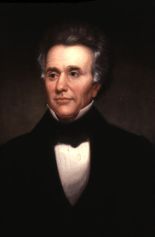Reuben H. Walworth
| Reuben Walworth | |
|---|---|
 |
|
| Chancellor of New York | |
|
In office April 28, 1828 – July 5, 1847 |
|
| Governor |
Nathaniel Pitcher Martin Van Buren Enos Throop William Marcy William Seward William Bouck Silas Wright John Young |
| Preceded by | Samuel Jones |
| Succeeded by | Position abolished |
| Member of the U.S. House of Representatives from New York's 12th district |
|
|
In office March 4, 1823 – March 3, 1825 |
|
| Preceded by | Ezra C. Gross |
| Succeeded by | Lewis Eaton |
| Personal details | |
| Born |
October 26, 1788 Bozrah, Connecticut, U.S. |
| Died | November 27, 1867 (aged 79) Saratoga Springs, New York, U.S. |
| Political party |
Democratic-Republican (Before 1828) Democratic (1828–1867) |
| Spouse(s) | Maria Avery (Deceased 1848) Sarah Ellen (Smith) Hardin (his death) |
| Children | 2 - Clarence A. Walworth (1820–1900) and Mansfield Tracy Walworth (1830–1873) |
Reuben Hyde Walworth (October 26, 1788, Bozrah, New London County, Connecticut – November 27, 1867, Saratoga Springs, Saratoga County, New York) was an American lawyer and politician. He was the last Chancellor of New York, in office from 1828 to 1847, at the time the highest judicial officer in the State.
Walworth was the son of Benjamin Walworth and Apphia (Hyde Cardell) Walworth. The family removed to Hoosick, New York, when Reuben was still a child. He studied law at Troy, was admitted to the bar in 1809, and commenced practice in Plattsburgh. On January 16, 1812, he married Maria Ketchum Averill (1795–1847).
Walworth was elected as a Democratic-Republican to the 17th United States Congress, holding office from December 3, 1821, to March 3, 1823. In April 1823, Walworth was appointed as Judge of the Fourth Circuit Court, and in October removed to Saratoga Springs. In 1828, Walworth was appointed Chancellor of New York, and remained in office until July 1847 when the office was abolished by the State Constitution of 1846.
Walworth gained President John Tyler's attention because of his widely respected opinions on evidence, pleadings, civil procedure, and arbitration. Tyler nominated him to the Supreme Court of the United States three times in 1844, but the nomination was always postponed due to Tyler's lack of support from both Whigs and the Democrats.
...
Wikipedia
